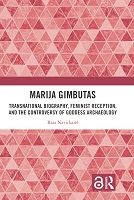Marija Gimbutas
Proposal review
GimbutasTransnational Biography, Feminist Reception, and the Controversy of Goddess Archaeology
Abstract
This book is a biography and reception history of the Lithuanian–American archaeologist Marija Gimbutas (1921–1994). It presents the first transnational account of Gimbutas’ life based on historical research, and an original examination of the impact of her ideas in various feminist contexts, both academic and popular. At the core of this book is a success story of an Eastern European woman who survived both Soviet and Nazi occupations of her homeland, lived as a displaced person in postwar Germany, and built her career and scholarly authority within the androcentric American academia. At the same time, it is also a story of a controversy, which followed Gimbutas’ theory of Old Europe – a prehistoric civilization, characterized by peacefulness, egalitarianism, women’s leadership, and the worship of the Great Goddess. First introduced in 1974, this theory inspired women’s movements worldwide, but was harshly criticized by other archaeologists. This book examines the various intellectual contexts (feminist, nationalist, theoretical) in which Gimbutas’ ideas were formed, received, and interpreted, as well as appropriated for different political goals. This timely study will appeal to scholars and students in the following fields: history of archaeology, prehistoric archaeology, gender studies, feminist studies, women’s history, Baltic studies, and religion and spirituality.

